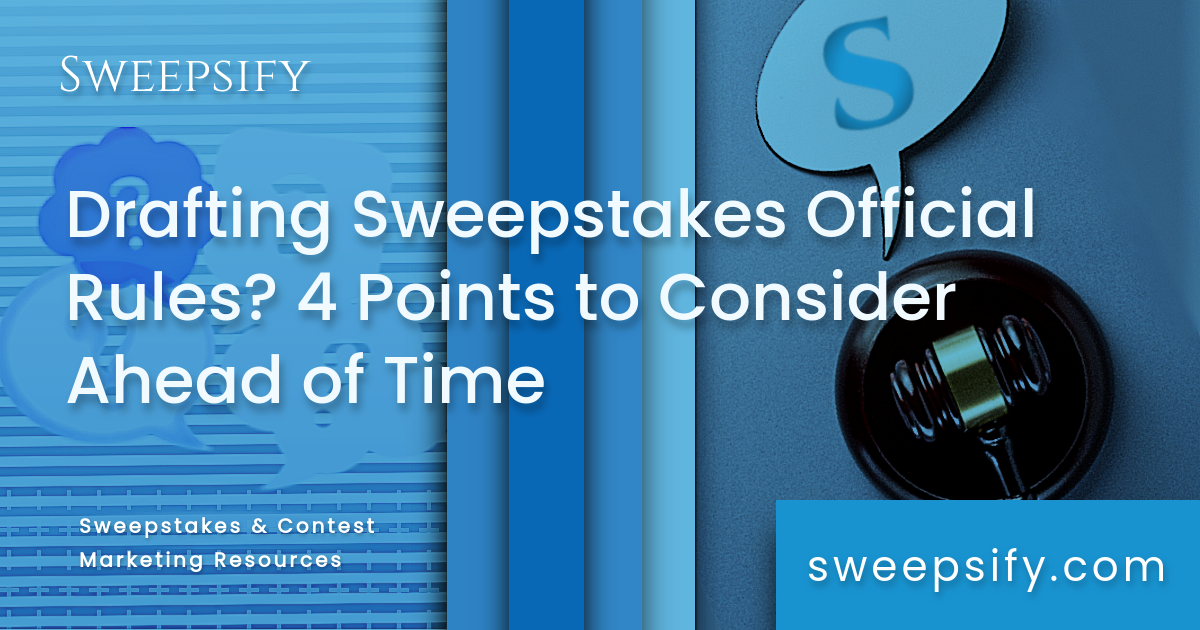Here is a list of our current affiliate partners and how we earn money
Sweepstakes official rules are the most important legal consideration in running a sweepstakes. While sweepstakes are a great way to engage your potential and existing customers and build loyal and trust in your brand, there are still legal risks.
Ensuring that your brand is properly protected while also making sure that your promotion runs smoothly has the added benefit of building trust with your sweepstakes participants.
People are more likely to want to enter and share your brand and sweepstakes with their friends if:
(1) You make your sweepstakes easily accessible and valuable to them;
(2) They can trust that your sweepstakes will deliver the prizes as promotions.
With the opportunity to win a prize, a sweepstakes promotion here are some important considerations for your sweepstakes official rules that you should think of ahead of time.
IN THIS ARTICLE:
- What to include in sweepstakes official rules?
- What are the legal risks of sweepstakes?
- Why hire a sweepstakes attorney?
Can You Require a Purchase to Enter a Sweepstakes?
Before you get started, you need to write the official rules for your sweepstakes. Sweepstakes rules require that you not only offer a free, alternative means of entry (“AMOE”), you must also ensure that your AMOE entries offer the same chance of winning as customers who made a purchase from your brand.
This is commonly referred as the No Purchase Necessary Law, or Lottery Law, and it applies all legal sweepstakes promotions in the United States.
Can you require a purchase to enter a sweepstakes? The short answer is no. All sweepstakes must offer a free AMOE.

Drafting Sweepstakes Rules
You should work with a sweepstakes administrator to help you determine all key aspects of the contest from the duration of the sweepstakes to prize descriptions and values and eligibility requirements. These are terms that should not be altered after the sweepstakes commences.
Here are some of the most important official sweepstakes rules you should be aware of when drafting official rules for your sweepstakes and some tips on how to do it thoroughly.
via GIPHY
1. Start and End Dates
These are the key dates of your promotion. When considering how long to run your sweepstakes for, base it on the value of the prizes. Shorter sweepstakes are perfect for mini prizes like merch and gift cards. While a longer duration sweepstakes is acceptable for sweepstakes with large cash prizes, vacations, and cars as the prizes.
Not only do you need the extra time to build up sweepstakes marketing for the promotions, you may also need it for planning the sweepstakes itself. Large prizes require prize fulfillment and additional winner verification steps.
Furthermore, you may also need to organize the delivery of the prize itself since there is much more required than simply shipping as with a merch sweepstakes prize or similar small value prize.
2. Sweepstakes Winners
Depending on the state(s) in which you run your sweepstakes, you may be required to file a list of winners with a state regulatory agency. Prior to the delivery of the prize to the winners, you should make sure that you collect affidavits from the winners and conduct ID verification.
A sweepstakes company can help you with this aspect of managing your promotion. If you also intend to use the sweepstakes winners in your marketing materials or for a public winner announcement, you will also need to obtain liability releases from the winners.
In addition, you should also make sure that your sweepstakes official rules prohibit your employees, business partners, vendor or sweepstakes co-sponsor’s employees, and other parties related to your business from sweepstakes participation.

3. Intellectual Property Rights and User-generated Content (UGC)
One of the major benefits of running a sweepstakes or social media contest is that they generate user-generated content (UGC) from your fans interacting with your brand. As you work with a sweepstakes attorney to draft your official rules, keep in mind that your official rules must comply with the Terms of Service of the websites on which you promote your sweepstakes.
Free Advertisement Maker with Templates
Canva lets you create eye-catching advertisements with their free ad maker. Customize your sweepstakes, contest, or raffle ads with trending images, fonts, and high quality design assets.
ADVERTISEMENT
This is especially important if your sweepstakes or sweepstakes prizes involve other brands with registered trademarks. Don’t overlook the fact that your sweepstakes also needs to comply with applicable federal and state laws when it comes to intellectual property rights.
Always make sure that you clearly outline in the official rules how your company uses user-generated content and obtain the proper written permissions.
via GIPHY
4. Prizes
Choosing the right prizes for your sweepstakes is mostly about getting the targeting right so that your sweepstakes prize makes your promotion seem valuable enough to enter. However, there are also many considerations when it comes to the official rules regarding sweepstakes prizes including:
ARV. You need to start the aggregate prize value of your sweepstakes prizes. If the amount exceeds $5,000 in New York and Florida, your sweepstakes needs to be registered and bonded. In Rhode Island, registration applies at a threshold of just $500, however, you do not need to bond your sweepstakes. The registration only applies to contests that are conducted at a retail brick-and-mortar location.
Some sweepstakes opt to exclude residents of these states from participation in their sweepstakes. Discuss with a sweepstakes administrator as to the best recommendations for where to run your sweepstakes.

Taxes. When participants accept their sweepstakes prizes, they are responsible for paying income taxes to the IRS on their prize. As a company, you will need to send a Form 1099-MISC to the sweepstakes winner and a Form 1096 to the IRS. A sweepstakes company can assist you with the paperwork involved in prize delivery so that all of your legal obligations as the sweepstakes sponsor are fulfilled.
Keep in mind however that it is still your responsibility to see appropriate tax and/or accounting advice as needed.
In addition, sweepstakes companies do not provide legal or tax advice to sweepstakes winners, participants or any other parties. You should make sure to seek out the appropriate professional expert advice on your own.
Subscribe Now:
These are just a few of the major legal hurdles that brands face when drafting official rules for sweepstakes.
There is no one way to write sweepstakes rules given that the details of the promotion vary from promotion to promotion. Take care in writing your sweepstakes official rules to avoid the risks of legal liability that could your promotion and your brand.
via GIPHY
Next Steps:
If you’re running an SMS sweepstakes or text to win promotion, you should also make sure that you follow mobile marketing rules. Read these next articles to learn more about text message sweepstakes:
- 5 Reasons to Run an SMS Sweepstakes Campaign
- What Does Express Written Consent Look Like for SMS Marketing?
Looking for a sweepstakes company to help you with drafting your official rules? Sweepsify helps you find top sweepstakes companies in seconds. Create your free Premium account now to get started.



